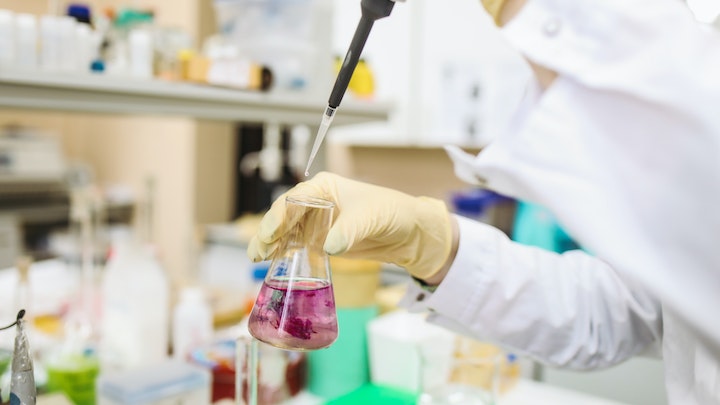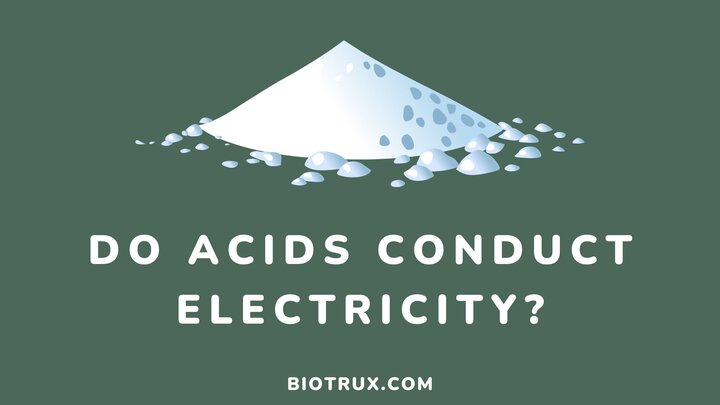Acids, in their pure form, do not conduct electricity. This is because their anions and cations are super stable. However, when they get dissolved in water or appropriate solvents, it becomes conductive.
At this point, the conductivity of each solution will depend on the type of acid and the nature of the solvent. In most cases, strong acids are usually better conductors than weak acids.
This guide will break down how acids conduct electricity in an aqueous state, various examples of acids that are good conductors, and their conductivity levels.
How Does Acid Conduct Electricity?

Acids naturally consist of stable ions or charges and are non-conductive at this stage. However, when they combine with water (pure or not) or other suitable solvents, their cations (positive ions) and anions (negative ions) separate.
This dissociation weakens the bond within the acid and allows ions to move freely. The faster these ions move, the more conductive an acid becomes. In the end, acids generally produce hydronium ions (H₃O⁺).
Factors Affecting the Conductivity of an Acid
An acid in an aqueous form is an electrolyte and can conduct electricity. This conductivity will, however, depend on the following factors:
1. Concentration of dissolved ions
Aqueous acids contain freely-moving positive and negative ions that conduct electricity. The presence of more ions in an acidic solution means better conductivity and vice versa.
In simpler terms, if you dissolve an acid in pure or distilled water, the solution will conduct electricity. However, this conductivity will be lower compared to that of a solution of acid and tap or rainwater.
This is because rain or tap water has more impurities and is already a good conductor without acids. Hence, ions become abundant with the introduction of acid.
2. Types of ions in solution
The ability of ions to conduct depends on the charge, size, and interaction with water molecules or other solvents. Inorganic ions such as Na+, K+, Mg+2, Ca+2, HCO3-, Cl–, and SO4-2 conduct electricity better than organic ions.
This is because organic substances undergo weak dissociation of ions in water.
3. Temperature
The effect of temperature on ions is relatively small but remains significant. An increase in temperature will heat the state of water or any appropriate solvent that makes up an acidic solution.
When water becomes warmer, the ions in the solution move more rapidly and conduct electricity better. Hence, it is safe to say an increase in temperature will make an acidic solution or electrolyte more conductive and vice versa.
Examples of Acids that Conduct Electricity
In terms of conductivity, acids can either be strong or weak conductors. Strong acids produce more hydronium ions when they dissolve in water than weak acids. This is why they are the better or stronger conductors.
- Examples of strong aqueous acids that conduct are sulphuric acid (H2SO4) and Hydrochloric acid (HCL).
- Examples of weak aqueous acids that conduct electricity formic acid (HCOOH), benzoic acid (C6H5COOH), oxalic acid (C2H2O4), hydrofluoric acid (HF), and nitrous acid (HNO2).
Which Acid is the Poorest Conductor of Electricity?
Acetic acid is a weak acid. It is rated very low in terms of conductivity because it prefers to remain uncharged (CH3COOH).
However, when it dissociates into hydrogen (H+) and acetate (CH3COO–) ions, there are very few ions for conduction. This can be improved with an increase in pH, which means the solution will become basic.
Uses of Acids
- Sulfuric acid features heavily in batteries due to its conductive ability.
- Vinegar (a weak derivative of acetic acid solution) serves as a common food preservative.
- Nitric acid and sulfuric acid are also raw materials for producing dyes, paints, explosives, and fertilizers.
- Most soft drinks contain phosphoric acid.
Do Acids Conduct Electricity Better than Bases?
Although bases neutralize acids, they also conduct electricity the same way acids do. In other words, none is a better conductor than the other.
The only difference is that bases dissociate in water and produce hydroxide ions (OH–). Factors that affect their conductivity also affect that of acids.
Examples of bases that conduct electricity are:
- Aluminum Hydroxide Al(OH)3
- Barium Hydroxide Ba(OH)2
- Zinc Hydroxide Zn(OH)2
- Sodium Hydroxide Na(OH)2
- Rubidium Hydroxide Ru(OH)2
- Ferrous Hydroxide Fe(OH)2
- Copper Hydroxide Cu(OH)2
FAQs
Are all acids conductive?
Acids in an aqueous state are electrolytes, hence, they conduct electricity.
However, strong acids become stronger electrolytes and will conduct more than weak acids or electrolytes.
Can vinegar conduct electricity?
Vinegar conducts electricity.
This is because it contains acetic acid which splits into free-flowing ions when dissolved.
Can milk conduct electricity?
Milk is a mixture of lactic acid, water, and salt, hence, it is a good conductor of electricity.
However, its conductivity is mainly due to the presence of soluble salt.
Conclusion
It is safe to say acids will only conduct electricity when they are dissolved in water or an aqueous state. Strong acids are better conductors than weak acids because they produce more hydronium ions when they dissociate in water.
Thanks to these varying conductivity, acids such as sulfuric acid play a major role in the production of batteries and explosives. Their less conductive equivalents feature in soft drinks or serve home-related purposes.
I hope you found this guide helpful. Perhaps you would like to know what normal or pure water (without acid) can do in terms of conductivity, please see if pure water conducts electricity.
Thanks for reading.

